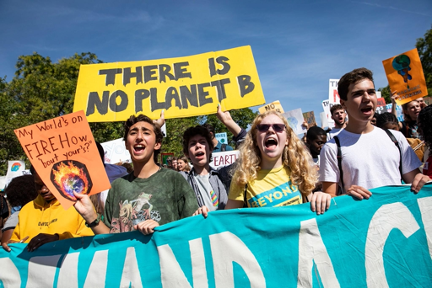Build Back Better plan hopes to slow down climate change issues
April 20, 2022
On Jan. 20, 2021, President Joe Biden rejoined the Paris Agreement, restoring the U.S. Leadership on the world stage, and reestablishing our position to tackle the climate crisis at home and abroad. However, this step did not come without resistance.
According to the United Nations Framework Convention on Climate Change website, the Paris Agreement is a legally binding international treaty on climate change.
Rejoining the Paris Agreement was a step forward in creating a brighter, cleaner future for generations to come.
Critics from the Republican Party are open to some policy approaches, but assign the issue as low priority. Only 31% of Republicans support a leading US role on limiting climate change, and just 16% consider it a critical threat according to Pew Research Center.
Observations made on and above the Earth’s surface show the planet’s climate is significantly changing and human activities are the primary drivers of those changes, according to NASA.
Evidence of rapid climate change is undoubtable. Human activities have warmed the atmosphere, ocean and land. The widespread and rapid changes in climate have affected the atmosphere, ocean, cryosphere and biosphere. The Earth’s global temperature has risen about 2 degrees Fahrenheit since the late 19th century. The years 2016 and 2020 are tied for the warmest year on record.
Biden’s stance on climate change is that it is not a challenge for future generations, but one all countries should face today. In Biden’s Build Back Better Framework, he said, “[Build Back Better] is the largest effort to combat climate change in American history.”
The policy aim is to cut greenhouse gas pollution by one gigaton by the year 2030. The climate investments in Build Back Better come largely through tax breaks for low-emissions energy sources. The bill’s largest spending portions include 10-year tax credits to grow and speed up investments in renewable power, including wind, solar and nuclear. The plan includes reducing consumer energy costs, giving future generations cleaner air and water, creating thousands of high-quality jobs and advancing environmental justice by investing in a 21st century clean energy economy.
To establish this new 2030 emissions target, Biden also launched the Nationally Determined Contribution or NDC, a formal submission to the UNFCCC. The submission is an assessment on how to make the best opportunity while combating climate change.
Amid all conflict, it is imperative to understand and realize we all have one place we call home – Earth. Rapid climate change is not only a bipartisan issue, but a global issue. We must make an effort to treat the Earth better. Climate changes affect all aspects of life on Earth. We must tackle this issue now so that future generations are able to thrive and grow.



